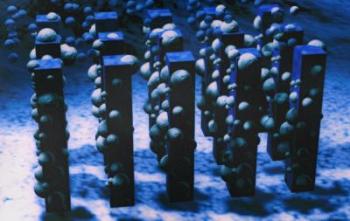Feb 5 2016
By 2020, California aims to use 33% of energy from renewable sources. With the deadline nearing, researchers from all over the state are trying to identify new variable options. Solar energy is an attractive source, but it has to be converted into a storable form for widespread adoption. In a new study published in ACS Central Science, researchers have described the development of nanowires from multiple metal oxides that could address the problem.
 Artists rendering of TiO2 Nanowires act as hosts for BIVO4 guests in water-splitting reaction. (credit: Peidong Yang)
Artists rendering of TiO2 Nanowires act as hosts for BIVO4 guests in water-splitting reaction. (credit: Peidong Yang)
Photoelectrochemical (PEC) water splitting is one way to harness solar power, as it can provide hydrogen for fuel cells. A large number of materials can accomplish the reaction exist, but they are flawed either in efficiency, costs, stability or other factors. Peidong Yang and his colleges have come up with a system in which nanowires made from TiO2 serve as “hosts” for “guest” nanoparticles from a different oxide known as BiVO4. This oxide is new, and one of the best for absorbing light and conducting the water splitting reaction, but it does not carry charge very well.
TiO2 is cheap, stable and can efficiently carry charge, but it cannot absorb light well. When used together with a novel studded nanowire architecture, the new arrangement works better than when the materials are used individually. The authors highlight that this approach can help to enhance the efficiency of several other photoconversion materials.